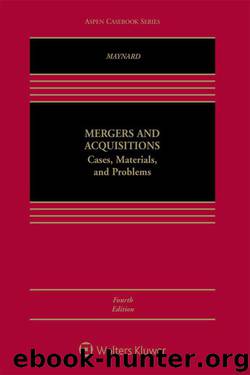Mergers and Acquisitions: Cases, Materials, and Problems (Aspen Coursebook Series) by Maynard Therese H

Author:Maynard, Therese H. [Maynard, Therese H.]
Language: eng
Format: epub
Publisher: Wolters Kluwer
Published: 2017-03-01T05:00:00+00:00
III.
The defendants argue that the determination of whether their decision to accept $55 per share for Trans Union represented an informed business judgment requires consideration, not only of that which they knew and learned on September 20, but also of that which they subsequently learned and did over the following four-month period before the shareholders met to vote on the proposal in February, 1981. . . . Thus, the defendants contend that what the directors did and learned subsequent to September 20 and through January 26, 1981, was properly taken into account by the Trial Court in determining whether the Board's judgment was an informed one. We disagree with this post hoc approach.
The issue of whether the directors reached an informed decision to “sell” the Company on September 20, 1980 must be determined only upon the basis of the information then reasonably available to the directors and relevant to their decision to accept the Pritzker merger proposal. This is not to say that the directors were precluded from altering their original plan of action, had they done so in an informed manner. What we do say is that the question of whether the directors reached an informed business judgment in agreeing to sell the Company, pursuant to the terms of the September 20 Agreement presents, in reality, two questions: (A) whether the directors reached an informed business judgment on September 20, 1980; and (B) if they did not, whether the directors' actions taken subsequent to September 20 were adequate to cure any infirmity in their action taken on September 20. We first consider the directors' September 20 action in terms of their reaching an informed business judgment.
On the record before us, we must conclude that the Board of Directors did not reach an informed business judgment on September 20, 1980 in voting to “sell” the Company for $55 per share pursuant to the Pritzker cash-out merger proposal. Our reasons, in summary, are as follows:
Download
This site does not store any files on its server. We only index and link to content provided by other sites. Please contact the content providers to delete copyright contents if any and email us, we'll remove relevant links or contents immediately.
Master of the Game by Sidney Sheldon(2282)
GRE Premier 2017 with 6 Practice Tests by Kaplan(1853)
Law School Essays that Made a Difference by Princeton Review(1796)
Objection! by Nancy Grace(1778)
Law: A Very Short Introduction by Raymond Wacks(1736)
A Life of Crime by Harry Ognall(1728)
Philosophy of law a very short introduction by Raymond Wacks(1654)
Examples & Explanations: Administrative Law by William F. Funk & Richard H. Seamon(1639)
College Essays that Made a Difference by Princeton Review(1633)
Writing to Win: The Legal Writer by Steven D. Stark(1587)
Cracking the SAT Premium Edition with 6 Practice Tests, 2017 by Princeton Review(1584)
Civil Procedure (Aspen Casebooks) by Stephen C. Yeazell(1553)
GMAT For Dummies by Lisa Zimmer Hatch & Scott A. Hatch(1534)
Sidney Sheldon (1982) Master Of The Game by Sidney Sheldon(1512)
Drafting Contracts: How and Why Lawyers Do What They Do, Second Edition by Stark Tina L(1484)
Storytelling for Lawyers by Meyer Philip(1460)
So You Want to be a Lawyer by Lisa Fairchild Jones Esq(1402)
Graduate Admissions Essays, Fourth Edition: Write Your Way into the Graduate School of Your Choice by Donald Asher(1367)
Introduction to the study and practice of law in a nutshell by Kenney F. Hegland(1317)
